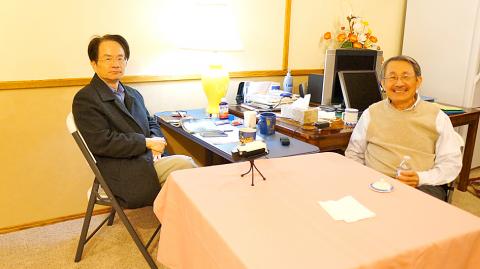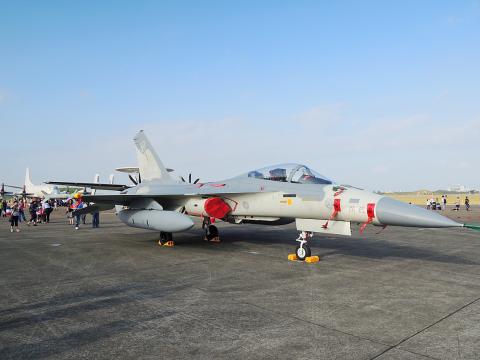Taiwan had plans to load miniaturized nuclear weapons into auxiliary fuel tanks of Indigenous Defense Fighter (IDF) jets to attack China, said Chang Hsien-yi (張憲義), who was the deputy director of the First Institute of the Chungshan Institute of Science and Technology (CSIST) and who defected to the US in 1988.
Due to the growing military threat from China, Taiwan during the 1980s conducted numerous military projects, including the research and development of mid-range surface-to-surface ballistic missiles, a nuclear weapons research project and the IDF project, Chang was quoted as saying in a new book that was based on an interview by Academia Sinica associate research fellow Chen Yi-shen (陳儀深), who last year went to the US to interview Chang.
Chang, a former colonel, said that the CSIST planned to use the IDF as a bomber because it was developed by Taiwan and its range could be fine-tuned without consulting other nations.

Photo provided by Walkers Cultural Publisher
“We wanted to extend the IDF’s range to 1,000km, as it would also extend the effective range of the nuclear weapon,” Chang was quoted as saying.
The plan was for a pilot — unmarried with no family and not having been told that they would be carrying a nuclear weapon — to fly the aircraft, Chang said.
With a nuclear weapon in the auxiliary fuel tank, the fighter jet would have a range of 800km, Chang said, adding that the pilot would only be told that they would be going on a mission from which they would probably not return.

Photo: Lo Tien-pin, Taipei Times
However, Chang said that the plan put ongoing US support at risk, adding that it was because of Taiwan’s ambitions that the US decided to “put the cards on the table.”
It was also because of this project that the US in 1988 forced Taiwan to shut down all facilities related to the development of nuclear weapons, as well as shuttering a heavy water reactor at the CSIST, Chang said.
When asked about his relationship with the US and the CIA, Chang said he was contacted by the CIA in 1982 and the agency established a task force on Taiwan and nuclear arms after he passed a polygraph test, adding that he would meet with CIA personnel every two or three months near Shilin (士林) night market in Taipei, mostly discussing what the government was purchasing for its nuclear weapons research, or the contents of CSIST or government meetings.
The CIA arranged his exit from Taiwan in 1988 by having a company registered in the US issue him a work visa and a new passport, providing a cover for him to fly from Kaohsiung to Seattle via Hong Kong, Chang said, adding that his wife transferred flights in Japan and met with him in the US.
Democratic Progressive Party Legislator Lo Chih-cheng (羅致政) yesterday said the decision to develop a nuclear deterrent had spanned military strategy, politics and diplomacy.
The US’ intervention was anticipated and reflective of the US as a hegemonic power, Lo said, but added that the US’ move was inexorably tied to Chang’s defection.
Putting aside the question of a soldier’s loyalty to his nation, and the moral question of developing nuclear weapons, Chang — while having been shielded from the Taiwanese judiciary — will have to answer to history for his actions, Lo said.
Meanwhile, a senior Ministry of National Defense official yesterday said that the nation’s policy regarding nuclear weapons is that “we do not manufacture, own or use nuclear weapons,” adding that since Taiwan does not have nuclear weapons, the possibility of attacking China with nuclear weapons does not exist.

GAINING STEAM: The scheme initially failed to gather much attention, with only 188 cards issued in its first year, but gained popularity amid the COVID-19 pandemic Applications for the Employment Gold Card have increased in the past few years, with the card having been issued to a total of 13,191 people from 101 countries since its introduction in 2018, the National Development Council (NDC) said yesterday. Those who have received the card have included celebrities, such as former NBA star Dwight Howard and Australian-South Korean cheerleader Dahye Lee, the NDC said. The four-in-one Employment Gold Card combines a work permit, resident visa, Alien Resident Certificate (ARC) and re-entry permit. It was first introduced in February 2018 through the Act Governing Recruitment and Employment of Foreign Professionals (外國專業人才延攬及雇用法),

WARNING: From Jan. 1 last year to the end of last month, 89 Taiwanese have gone missing or been detained in China, the MAC said, urging people to carefully consider travel to China Lax enforcement had made virtually moot regulations banning civil servants from making unauthorized visits to China, the Control Yuan said yesterday. Several agencies allowed personnel to travel to China after they submitted explanations for the trip written using artificial intelligence or provided no reason at all, the Control Yuan said in a statement, following an investigation headed by Control Yuan member Lin Wen-cheng (林文程). The probe identified 318 civil servants who traveled to China without permission in the past 10 years, but the true number could be close to 1,000, the Control Yuan said. The public employees investigated were not engaged in national

The zero emissions ship Porrima P111 was launched yesterday in Kaohsiung, showcasing the nation’s advancement in green technology, city Mayor Chen Chi-mai (陳其邁) said. The nation last year acquired the Swiss-owned vessel, formerly known as Turanor PlanetSolar, in a bid to boost Taiwan’s technology sector, as well as ecotourism in Palau, Chen said at the ship’s launch ceremony at Singda Harbor. Palauan President Surangel Whipps Jr and Minister of Foreign Affairs Lin Chia-lung (林佳龍) also attended the event. The original vessel was the first solar-powered ship to circumnavigate the globe in a voyage from 2010 to 2012. Taiwan-based Porrima Inc (保利馬) installed upgrades with

ENHANCE DETERRENCE: Taiwan has to display ‘fierce resolve’ to defend itself for China to understand that the costs of war outweigh potential gains, Koo said Taiwan’s armed forces must reach a high level of combat readiness by 2027 to effectively deter a potential Chinese invasion, Minister of National Defense Wellington Koo (顧立雄) said in an interview with the Chinese-language Liberty Times (sister newspaper of the Taipei Times) published yesterday. His comments came three days after US Secretary of State Marco Rubio told the US Senate that deterring a Chinese attack on Taiwan requires making a conflict “cost more than what it’s worth.” Rubio made the remarks in response to a question about US policy on Taiwan’s defense from Republican Senator John Cornyn, who said that Chinese